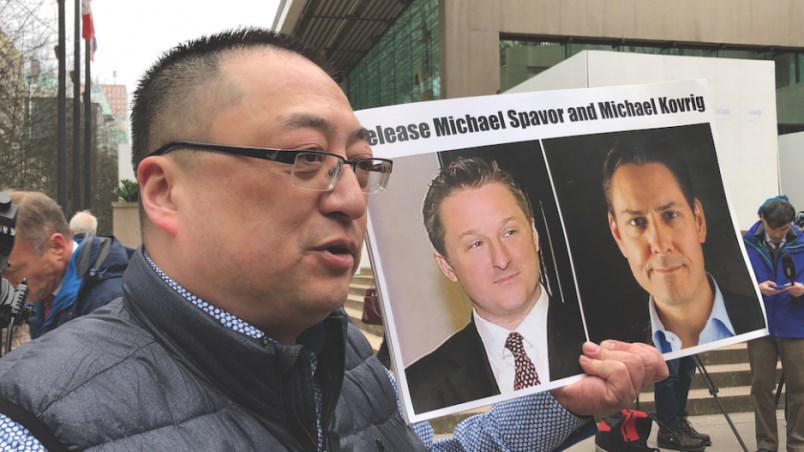Ottawa lobbied the Trump White House and the Communist Party of China’s highest body in an effort to free two Canadian nationals, freedom of information documents show.
Chinese authorities arrested Michael Kovrig and Michael Spavor shortly after the arrest of Huawei executive Meng Wanzhou at Vancouver International Airport on Dec. 1, 2018. Meng was arrested on a U.S. extradition request.
The Canadian government became aware of the men's detentions on Dec. 10, 2018.
Known as the "Two Michaels," Kovrig was a former Canadian diplomatic service employee working for International Crisis Group when he was detained; Spavor was held after operating cultural exchange tours into North Korea from the Chinese border city of Dandong.
Through the course of their 1,019 days of detention, Canadian federal officials said they did not want to politicize Canada-U.S. extradition treaty obligations. But according to heavily redacted documents obtained by Glacier Media through federal freedom of information (FOI) legislation, Canadian officials actively lobbed foreign politicians in an effort to secure their release.
Documents show Canada's Minister of Foreign Affairs had conversations with China’s Minister of Foreign Affairs Wang Yi and Yang Jiechi, director of the Political Bureau of the Communist Party of China Central Committee, the party’s 25-member, highest decision-making body.
Conversations were also held between the Canadian minister at the time and three senior U.S. senators — Republican senators Lindsey Graham and Bob Corker, and Democrat Bob Menendez. Canadian officials wanted the three men to lobby fellow members of congress, according to the FOI documents. In Sen. Graham’s case, the documents indicate the Canadian minister asked him to lobby members of the Trump administration.
None of the documents name the Canadian minister of foreign affairs, but Chrystia Freeland held the office when each of the calls were made.
In a call with Sen. Corker, ministerial notes said it was “important to counter Chinese narrative that Canada has ‘kidnapped’ Ms. Meng at USA’s behest.”
“The arbitrary detention of two Canadians (blacked out) sends the wrong message to countries such as the U.S. and Canada who are working to further deeper bilateral relations with China,” the document said.
The then-Canadian minister of foreign affairs also spoke with German Minister of Foreign Affairs Heiko Maas, and was briefed on discussions Canadian officials had with their European Union (EU) counterparts in both Beijing and Brussels. The documents offered no details on what was discussed.
The names of some people the Canadian minister called were blacked out and many of the redacted documents are labelled ‘Secret.’
Throughout the documents, the Canadian side reiterated its government is bound by foreign treaties, including its extradition treaty with the United States.
On multiple occasions, the documents state: “Canada is a country governed by the rule of law with a strong and independent judicial system.”
The so-called "top-line messages" to the senators were that Canada appreciated U.S. Secretary of State Mike Pompeo’s calls for the release of Kovrig and Spavor, that the arrest of Meng was pursuant to the Canada-U.S. extradition treaty, and that “China’s reaction to the Meng case is deeply concerning, including the detention of two Canadian citizens.
"Such conduct," reads the document, "harms China’s reputation.”
Glacier Media requested the documentation about the well-being, custody conditions and potential release of Kovrig and Spavor on Feb. 15, 2019. They arrived over three years later on Feb. 25, 2022.
They indicate Kovrig had his first Canadian consular visit from then-ambassador John McCallum on Dec. 14, 2018. Spavor received his first consular visit from Canadian officials a few days later, on Dec. 16. Such visits are a requirement under international treaties.
Kovrig (also a Hungarian-EU citizen) and Spavor were arrested for espionage, Beijing said. However, many observers noted the detentions were likely carried out in retaliation for Meng’s arrest and detention.
Meng's discharge from her extradition process in September came after the Huawei executive reached a deferred prosecution agreement with U.S. authorities. Under that agreement, she was required to follow a list of obligations and not challenge an American statement of facts on the case that stated Meng knowingly deceived the bank HSBC about its subsidiary’s operations in Iran.
In exchange, Meng would not have to plea guilty to U.S. charges of fraud and money laundering, and the US Department of Justice would drop charges against her if all obligations were followed up to Dec. 1, 2022.
Back in August 2021, Spavor was sentenced in a Dandong court to 11 years in prison, a fine of about $8,000 and deportation.
Kovrig, who was arrested and tried in Beijing, was awaiting his sentencing at the time of his release.
On Sept. 25, 2021, the pair landed at Calgary International Airport in a Royal Canadian Air Force Challenger aircraft. Waiting to greet them were Prime Minister Justin Trudeau and then-Foreign Affairs Minister Marc Garneau.


